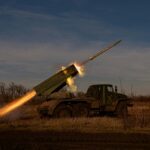Sudan’s acute political crisis has a subtle American origin. Since 2017, the Russian mercenary group Wagner helped shape — and apparently continues to shape — Sudan’s imploding security architecture. Wagner is a perverse offshoot of something that started in the United States: the normalized use of private military and security contractors in foreign policy.
This gigantic global industry is shockingly underregulated and liable to corruption and abuse. For the United States, which heavily relied on contractors to carry out its wars over the past two decades, this opaque industry is causing unpredictable and dangerous consequences at home and abroad.
THE PROLIFERATION OF PMSCS
What really are private military and security companies (PMSCs)? In the most basic terms, a PMSC is a for-profit entity that provides military or security services on a contractual basis. Yet, few companies falling under this definition would identify themselves as such due to the term’s negative connotations and prefer labels like “defense contractor,” security consultancy,” or “risk management firm.” Clients include governments, militaries, international organizations, private companies, nongovernmental organizations, wealthy individuals — anyone who can pay. Such companies are typically run and staffed by veterans and ex-officials of the governments they work for, though foreign nationals often fill lower ranks.
The size of this industry is staggering. One market research firm estimated that the global PMSC industry sold $223 billion worth of services in 2020, a number set to double by 2030. The United States has an outsize stake in this industry as the home government of many of the largest private military companies in the world and also as a major client.
The United States relies heavily on PMSCs for several reasons. Doing so reduces the overhead costs, at least on paper, of maintaining certain deployable military assets, such as logistics units, camp support, and management staff. It also provides a reserve of operational capabilities that could be tapped on relatively short notice. Contractors also help reduce — or obscure — the size and human cost of military deployments; contractors, many of whom are foreign nationals, often outnumbered US troops deployed in Iraq and Afghanistan.
American veterans becoming Emirati generals is just one symptom of a broader, unpredictable illness.
These “advantages” callously disregard the industry’s inherent risks. First and foremost, the services these companies provide are unlike any other service industry. Like firearms, they are profoundly dangerous and destructive in the wrong hands. For all its market clout, the US government is not the only client in this market. Many bad actors have benefitted from the explosive growth and normalization of an industry that ultimately sells the knowledge behind weapons, if not the weapons themselves.
Second, the United States never got around to properly regulating this sector. Despite a not-so-slow drip of contractor scandals, abuses, and failures during the wars in Iraq and Afghanistan, no single US law covers the full extent of services offered by such companies, and US contractors sell their services abroad with little oversight. Tweaks were made to existing laws and regulations here and there (for example, in government contracting regulations), but unscrupulous contractors don’t need to find loopholes in these laws when massive gaps exist.
Third, the industry enjoys the double opacity of handling proprietary information and being national security-related. Leadership, staff, contracts, supply chains, and subcontractor relationships are often close-kept secrets. On top of that, many contractors rely heavily on informal networks and relationships to conduct business — networks often built within and between government agencies and national militaries. These networks are often transnational, transcend institutional boundaries, and utilize elaborate corporate fronts to obscure who’s involved.
The result is that neither you nor the US government has any idea what a firm stacked with special forces veterans actually does and who they’re working with. Those veterans and their business partners may be connected to officials in decision-making positions and may control the companies they subcontract, creating opportunities to steer procurement decisions and siphon off wealth. During the wars in Iraq and Afghanistan, the partners were often the relatives of local power brokers who could provide their US counterparts kickbacks in exchange for a cut of a US government contract.
THE PUBLIC COST OF PRIVATE SECURITY
These partnerships have had consequences. In Afghanistan, a politically connected contractor providing security for NATO logistics convoys reportedly staged firefights and attacks in order to increase demand for their services. US contractors with close ties to the military often subcontracted the affiliates of unscrupulous politicians and warlords, thereby financing and legitimizing violent actors. It also put US missions at risk of extortion by their nominal partners: wouldn’t it be a shame if someone attacked this supply convoy? This was just one form of contractor waste and corruption.
The cumulative impact of these abuses on the wars in Iraq and Afghanistan was clearly catastrophic. The Special Inspector General for Afghanistan Reconstruction reported in 2020 that contractors lost up to 30% of the appropriated funds it audited through fraud, waste, and abuse between 2002 and 2019. Much of that money went into the pockets of local power brokers and well-positioned individuals in the contractor industry, often through collusion and probably reinforcing dynamics of violence and instability in the long run.
Elsewhere in the world, the normalization of PMSCs has given despots and corrupt regimes an effective means of bypassing national and international laws governing the use of military force. Russia, China, Turkey, and the United Arab Emirates have all taken ruthless advantage of nominally private military entities to carry out their bidding under the radar. Israeli private intelligence and cybersecurity companies have given dictators powerful spying tools to quell legitimate dissent. In Haiti, Colombian contractors assassinated President Jovenel Moise, plunging the already fragile country into violent anarchy.
US contractors have directly contributed to this. The UAE has built its own ecosystem of military and intelligence contractors with the help of former US officials, veterans, and industry experts, even employing them in what appear to be direct command-and-control positions. Through PMSCs, Americans have reportedly had a direct hand in busting the Libyan arms embargo, training rights-abusing militias in Somalia, targeting civilians in Yemen, and spying on US citizens critical of the UAE’s monarchy.
A BAD OUTLOOK
If that sounds bad, it’ll probably get worse. With no more large-scale deployments in Afghanistan and the Middle East and with US focus shifted back to its traditional adversaries, the United States is left with a generation of adrift and underregulated military contractors. This will almost certainly metastasize into the next big national security headache, if not crisis. American veterans becoming Emirati generals is just one symptom of a broader, unpredictable illness.
The migraine has already started. Contractor misadventures abroad undermine US interests and credibility. One US PMSC’s founder attempted to launch an oil operation in Kurdish-held parts of Syria with apparently enthusiastic support from the then-Trump administration. It didn’t go too well, as corrupt political factions in Northern Iraq reportedly extorted it out of existence. It also probably ratcheted up international competition over the oil wells of Northeast Syria.
In the utterly bizarre yet humiliating Macuto Bay incident, a US private military contractor attempted to depose the Maduro regime of Venezuela with a Bay of Pigs-style incursion. Entirely unsurprisingly, it ended just like its prequel, with two former green berets captured (along with several dissident Venezuelans) by a hostile government and interrogated on television. The debacle handed the Maduro regime an unimaginable propaganda victory.
Perhaps most concerning, PMSCs are becoming increasingly entwined in US domestic politics. Erik Prince, brother of Trump’s education secretary, reportedly helped Project Veritas recruit former intelligence officers to spy on left-leaning organizations and politicians. As one of his final acts, then-President Donald Trump pardoned four Blackwater contractors who massacred 14 Iraqis in the 2007 Nissour Square massacre. In Florida, Governor Ron Desantis’ reportedly contracted a military aviation firm to fly migrants from Texas to Martha’s Vineyard.
A Florida district also recently elected a former PMSC boss, Cory Mills, as its congressman, who now sits on the House Armed Services and Foreign Affairs Committee. A recent Business Insider article pointed out the massive conflict of interest here, as both he and his wife appear to remain in control of the company he is meant to regulate. Campaign financial disclosures indicate that his main source of income is property rent paid to him by his own company, suggesting he continues to have a deep financial relationship with it. On top of that, any foreign or private actor seeking to buy his favor could do so through a discreet and generous contract with his PMSC.
On this final note, contractor corruption has come home to roost. The opacity of the industry conceals dubious relationships from public view. The size of defense contracts makes it easy to conceal bribes or undue benefits. Without urgent reform in how PMSCs are regulated and overseen by the US government, the US faces a real risk of political capture by a dangerous and opaque industry.














